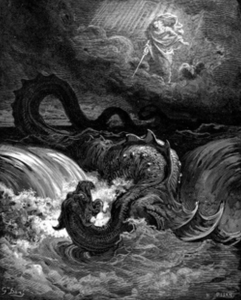 Beit Shemesh, January 21 – One of Israel’s small, niche zoos has put itself on the map by becoming the first such establishment in the world to house the legendary Leviathan.
Beit Shemesh, January 21 – One of Israel’s small, niche zoos has put itself on the map by becoming the first such establishment in the world to house the legendary Leviathan.
The Biblical Museum of Natural History in the Northern Industrial Zone of this town west of Jerusalem specializes in showcasing the creatures mentioned by name in Scripture, from the lowly creeping animals of Leviticus whose corpses render a person unclean to the majestic horned beasts that came to symbolize pride and glory in Psalms. Other zoos, notably one in Jerusalem, have styled themselves “Biblical,” with signs near the animal displays featuring verses that mention the beast in question. But the Jerusalem Zoo long ago abandoned its exclusively Biblical flavor, choosing to attract visitors and their cash with kangaroos, elephants, penguins, and all manner of African safari staples such as rhinoceroses and zebras. The scale and selection of creatures at larger zoos has relegated the smaller establishments to niche status, but this week, the BMNH trumped even worldwide zoological powerhouses by landing the largest sea creature known to man.
The Leviathan in this zoo is male, since a female specimen remains unavailable. Dubbed Jumbo by the staff, the massive marine creature inhabits an entire valley that has been damned to hold the water pumped in from the Mediterranean. Leviathan Lake measures eighteen square miles, with a single hilltop protruding in the middle to serve as an observation post. Two farming communities were relocated to make room for Jumbo’s aquarium, their residents reimbursed with monies donated by American evangelical philanthropists.
Conservation experts call the Leviathan project the largest single zoological exhibit ever constructed. Zoo officials declined to disclose the full expenditures involved in the construction and logistics of the site, but publicly available records indicate a figure exceeding $34 million, possibly twice as much.
No Leviathans have been observed in the wild in many centuries, making the zoo’s acquisition of Jumbo a considerable coup. Scholars have disagreed for ages regarding the taxonomic classification of the beast, and this opportunity to observe it up close and document its features constitutes an unprecedented biological opportunity. Older sources describe the Leviathan variously as a fish, a dragon, and a serpent, and zoo Rabbi Natan Slifkin says that researchers will have ample opportunity to study it and form their own conclusions.
“One thing to keep in mind is that the Bible and other ancient sources did not follow the now-common Linnaean method of taxonomy,” he explained. “For example, we’re used to considering bats mammals, but the Torah calls them birds. The physiology wasn’t the issue in Deuteronomy – it was the human experience of the encounter with the creature that determined its classification. So whether the ancients described Jumb- I mean the Leviathan as a dragon or what have you, that will have no bearing on how twenty-first century scientists categorize it.”
“Personally, though, I’m just looking forward to finding out how it tastes.”




